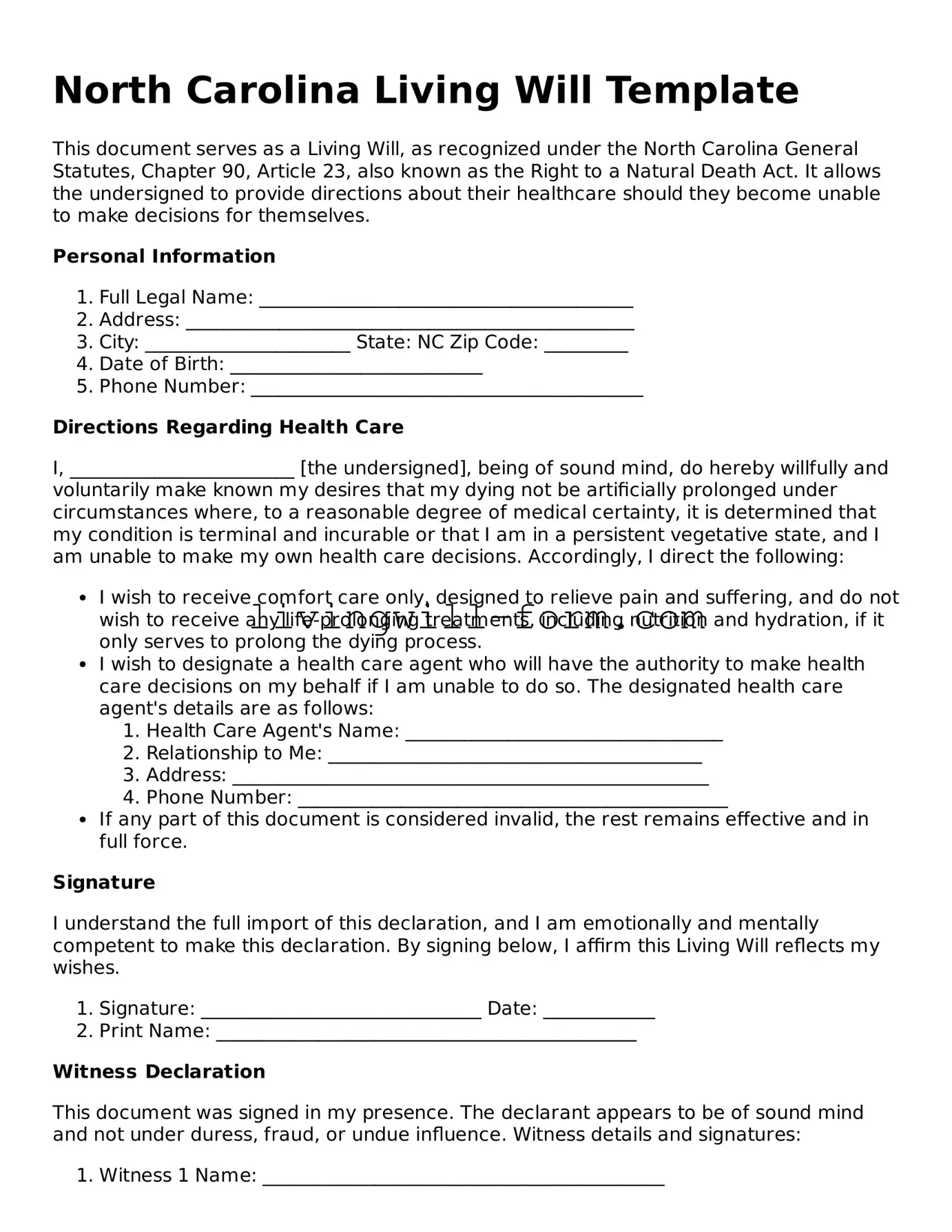The North Carolina Living Will, officially known as an "Advance Directive for a Natural Death," shares similarities with a variety of other legal documents that allow individuals to express their preferences about their personal care and management of their affairs. One such document is a Medical Power of Attorney. This legal document lets an individual appoint someone to make healthcare decisions on their behalf if they become unable to do so. While the Living Will specifies the kinds of medical treatment one wishes to refuse or receive at the end of life, the Medical Power of Attorney designates a trusted person to make a range of healthcare decisions, reflecting a broader scope of authority.
A Durable Power of Attorney for Finances is another document related to the Living Will. It allows an individual to appoint someone to manage their financial affairs. While the Living Will focuses on healthcare decisions at the end of life, the Durable Power of Attorney for Finances covers the management of one's financial matters, such as paying bills and managing investments, if they become incapacitated.
The Health Care Proxy is similar to a Medical Power of Attorney and, by extension, shares connections with a Living Will. It specifically lets someone choose a healthcare agent to make decisions on their behalf regarding medical treatment if they are unable to communicate these decisions themselves. Both documents serve to ensure that healthcare decisions align with the individual's preferences, even if they can't express those preferences themselves.
Another related document is the Do Not Resuscitate (DNR) Order. This medical order prevents the use of cardiopulmonary resuscitation (CPR) if an individual's heart stops or if they stop breathing. Like a Living Will, a DNR Order is a directive regarding a specific aspect of end-of-life care, focusing on the refusal of CPR to allow a natural death process.
A POLST (Physician Orders for Life-Sustaining Treatment) form also bears resemblance to the Living Will. This medical order specifies the types of medical treatment a patient wants towards the end of their life, based on discussions with their doctor. While the POLST is more detailed about certain treatments and is designed for those with serious illnesses, a Living Will takes a broader approach to end-of-life care wishes.
The Five Wishes document combines elements of a Living Will and a Health Care Proxy. It allows individuals to detail their personal, emotional, and spiritual needs in addition to their medical and legal preferences at the end of life. This comprehensive approach makes it a more holistic version of a Living Will, addressing a wider array of concerns and preferences.
A Last Will and Testament, while primarily focused on distributing assets after death, shares the foundational idea of expressing one's wishes in writing to ensure they are followed upon incapacity or death. Unlike a Living Will, which deals with health care preferences at the end of life, a Last Will and Testament deals with the distribution of one's estate and other final matters.
An Ethical Will, though not a legal document, is related in purpose to a Living states that the North Carolina Living Will. It allows individuals to leave behind a personal statement that shares life lessons, values, blessings, and hopes for future generations. While it doesn't have legal standing, it complements the intent behind a Living Will by expressing personal wishes and values.
Emergency Medical Information Cards are practical tools that provide quick access to an individual's medical preferences, including elements found in a Living Will, such as allergies, conditions, and even end-of-life wishes like DNR orders. While not as comprehensive or legally binding as a Living Will, they serve a similar purpose in communicating critical health care preferences in emergency situations.
Finally, a Trust, specifically a Revocable Living Trust, while mainly used for managing and transferring assets during and after the trustor's lifetime, can incorporate instructions similar to those found in a Living Will regarding the management of assets to cover healthcare expenses. Although primarily financial in nature, a trust can work in conjunction with a Living Will to ensure a person's care preferences are financially feasible.

